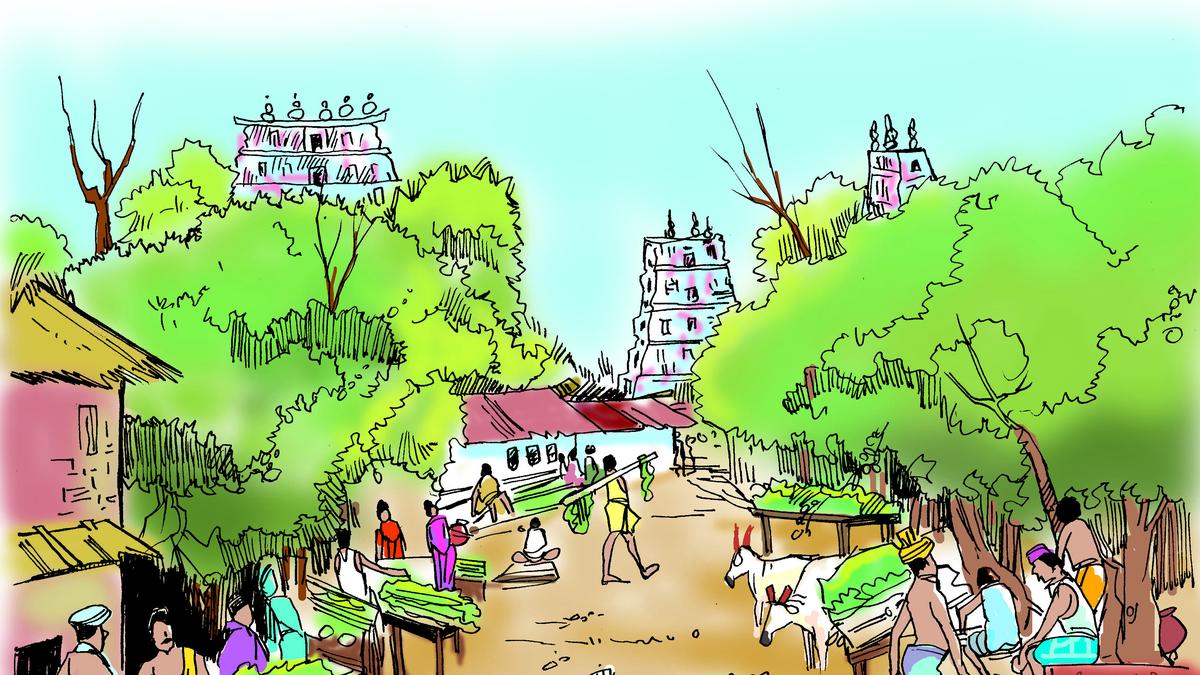Representational image. Illustration: Satheesh Vellinezhi
The Madras High Court has denounced the practice of mentioning the names of particular dominant castes in a temple festival invitation and subsuming the Scheduled Castes under the generic term of ‘oorar’ (local residents) on the pretext that the latter do not make monetary contributions for the celebration.
A Division Bench of Justices M.S. Ramesh and A.D. Maria Clete wrote: “We are of the considered opinion that temple festivals should be inclusive and celebrated by all people belonging to the Hindu religion, which, by definition, includes Scheduled Caste individuals as well.”
The Bench went on to write: “The practice of listing specific caste names in the temple invitation solely on the basis of financial contributions is unwarranted, especially when the exclusion of Scheduled Caste individuals is justified on the ground that they have not made monetary contributions.”
The judges directed the Hindu Religious and Charitable Endowments (HR&CE) department to ensure that the invitations to be printed in the future for the annual festival of the Arulmigu Nadiamman Temple in Pattukottai of Thanjavur district do not carry the names of any caste groups.
The orders were passed on a public interest litigation petition filed by local resident K.P. Selvaraj insisting upon mentioning Adi Dravidars (Scheduled Castes) too in the invitation. Senior counsel G. Prabhu Rajadurai, assisted by I. Robert Chandrakumar, had argued the case for the petitioner.
After reserving orders in the case at the Madurai Bench of the High Court and pronouncing them at the principal seat in Chennai, the Division Bench disapproved of the practice of the temple festival invitation carrying the caste names of Rajus, Naidu Vagayars, Kallars and Chettiars for having sponsored the mandagapadi.
The Bench also expressed suprise over the Executive Officer of the temple having filed a counter affidavit justifying the printing of select caste names in the invitation on the ground that the Scheduled Caste residents do not contribute any money for the conduct of the first day of the festival.
Authoring the verdict for the Bench, Justice Clete recalled B.R. Ambedkar, the chairman of the Constitution drafting committee, to have said: “The whole tradition of the Hindus is to recognize the untouchables as a separate element and insist upon it as a fact.”
In his renowned lecture titled ‘Annihilation of caste’ which was never allowed to be delivered but published later, Ambedkar had said: “Caste is not a physical object like a wall of bricks or a line of barbed wire which prevents the Hindus from co-mingling, and which has, therefore, to be pulled down… The destruction of caste does not therefore mean the destruction of a physical barrier. It means a notional change.”
Further, while dealing with a case related to exclusion of Scheduled Castes from the practice of pulling the Kandadevi temple car, the High Court in 2005 had categorically observed that courts could no longer tolerate such kind of treatment of the Scheduled Castes and Scheduled Tribes since they were also equal citizens of the country and entitled to a life of dignity.
“After the promulgation of the Constitution, all customs which are in violation of Articles 14 (equality before law), 21 (right to life and personal liberty) and other constitutional provisions are null and void, and have to be disregarded, since the Constitution is the fundamental law of the land,” the court had ruled then.
While dealing with a case related to a law and order issue that had arisen due to participation of the Scheduled Caste residents in a temple festival at Thoppunayagam village in Orathanadu taluk of Thanjavur district in 2008, Justice K. Chandru (since retired) of the High Court had expressed pain over such discrimination occurring even in the dawn of the 21st century.
Therefore, “the socio-religious practices around such festivals have traditionally excluded the Scheduled Castes from active participation, except for assigning them specific services during the festival. There is no gainsaying that festival tasks are to be carried out based on caste: Cleaning the temple premises where the festival takes place and the paths used for the deity’s procession, erecting pandals, and skinning sacrificed goats are the duties of the Pallars. Clearing the waste collected by the Pallars, as well as drumming during festival times, is the duty of the Paraiyars. Shaving the heads of those who wish to do so during festivals is the duty of the Ambattars,” Justice Clete wrote.
In so far as the present case was concerned, the selective invisibility of the Scheduled Castes from the temple festival invitation ensures that the “dominant castes are acknowledged while the Scheduled Castes remain unseen, thereby denying them meaningful participation in society. The failure to explicitly recognize the Scheduled Castes forces them into a dilemma- either accept invisibility or assert their caste identity to gain acknowledgment,” the judge observed.
Published – February 23, 2025 11:42 am IST

